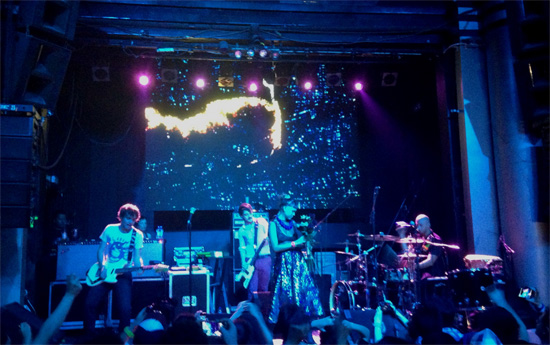The thought of "party music", the idea of a musician ordering you to have fun and the slightest whisper of a reggaeton beat are all things that normally send this writer running at top speed in the opposite direction. Colombia’s Bomba Esteréo however, manage not to trigger off this allergy to much modern Latin dance music. I first encountered the quartet after they released their third album on London’s own Soundway, continuing and expanding the label’s roster of artists and compilations celebrating cumbia, Colombia’s most popular music and a three-way fusion of Native Colombian, African and Hispanic music. Bomba Esteréo purport to be a ‘psychedelic cumbia’ band – which isn’t far off – but in many ways their sound is simply what happens when traditional cumbia instrumentation gets plugged in: accordions become a wall of guitars and synths, while washboards are usurped in kind by samplers and drum kits. The group’s name derives from a Colombian term for a great party (yes, you guessed it – ‘Stereo Bomb’), and they both physically and aurally embody the cross-pollination and colourful heritage of their home and culture.
In the backdrop of summertime Madrid, the dichotomy of modern day culture here becomes readily apparent, particularly to a Londoner. Work is eschewed and street parties thrive, and yet it’s tough to argue against it. Jobs are beyond scarce, while rent, food and drink all remain relatively cheap. We’re talking 1€ for a beer and €4 for 25g of tobacco. The pillars of cigarette and joint smoke emanating from the defiant Spanish crowd in Madrid’s Sala Arena throughout the set testify to the city’s disregard for any attempt to put a premium or lid on indulgence. And it oozes from the music.
Opening with an extended and rumbling ambient synth battle between founder Simón Mejía and an excitable Julián Salazar, Mejía soon flicks the switch on the first of the evening’s samples, and ushers on drummer Kike Egurrola and charismatic singer/rapper Liliana Saumet. The excitable crowd – undeterred by the fortysomething degree heat in the arena – simply explode from the first hint of cumbian rhythm. The key to Bomba Esteréo’s brilliance is in Simón Mejía’s instrumentation and his dense arrangement of every song’s bed. While the tropical and African guitars coalesce with extrapolated and twisted Cumbian rhythms – in essence a sort of blend of Caribbean, Prince Buster-esque chickachicka ska offbeats with far busier Latin on beats – it’s the keyboard washes and fuzzed bass lines that make this 21st century party music. What’s more, Liliana Saumet is the kind of vocalist that can make a pop song into an event, or indeed a gig into a piece of art.
In many ways she is the embodiment of the music. Saumet strides rather than dances, and somehow copes with donning a furry jacket amidst the heat during one of her several campy costume changes. Her duties waver between singing and rapping, with the latter occasionally approaching almost death defying speeds. The group’s extended run through the gentle, dub-infused ‘El Alma y el Cuerpo’ (‘The Soul and the Body’) sees Saumet saunter back on stage having again changed outfits during the song’s intro, with an armful of red roses. She throws petal after petal at the audience, all the while offering lyrics exorcising the demon of an ex-lover (I receive some translation help from a local friend). The ten-minute song is simply brilliant, teetering on a knife’s edge due to its dynamics, but – like the rest of the show – constantly grounded on a bed of metronomic samples and that Latin pulse.
Unlike the barren and moronic producer-led reggaeton that emanates over Colombia from Panama and Puerto Rico to the North, this cumbia is made like all great pop music; every song is certainly a ‘song’ and not a ‘track’. What could easily be misconstrued as a sort of deplorable sassiness, it turns out is, in fact, pride. Few nations have as marred a reputation as Colombia. Brought into existence by imperialism and subsequently torn to pieces by civil conflict and crime, the nation’s people are nonetheless culturally rich and unique, with nearly half the population comprised of mestizo individuals (those with both European and native Colombian ancestors). Bomba Esteréo creates brilliant pop music that respresents this crucible-like effect. South American culture, and in particular its music culture, has always been skilled at blending influences from its various communities into something new, rather than re-dispersing them into a patchwork.
After the show, a procession of Colombians bang drums and sing while marching through Madrid to the after party, traversing the Plaza de España and waving the Colombian flag. Spaniards are roused to their feet, the procession picking up follower after follower. Under the shadow of the towering Edificio España, vacant since its sale in 2005, Spain seems like a nation struggling with standstill, while the victory march of Colombia’s greatest modern band seemingly signals a culture coming into its own.


